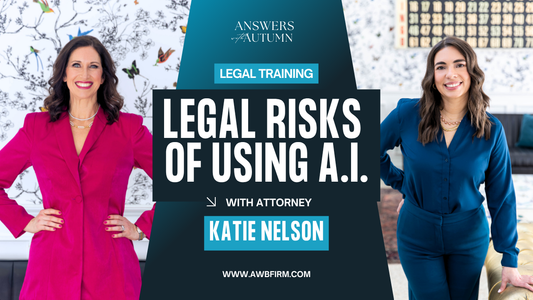AI Tools and Legal Trouble: What Every Business Needs to Know
Artificial intelligence tools like ChatGPT, Midjourney, and Canva are making business processes faster, cheaper, and more efficient than ever before. But alongside these benefits, AI can also quietly expose your business to serious legal risks.
Most business owners don’t realize what they’re risking when they use AI for tasks like drafting content, summarizing meetings, or screening job applications. The good news is that with the right precautions, you can take advantage of these tools without accidentally opening your business up to legal headaches or financial loss.
Here’s what you need to know to use AI tools legally and responsibly.
Watch the Full Legal Training Session
Why AI Is a Legal Minefield for Businesses
While AI can be a powerful resource, it’s not perfect and it’s definitely not risk-free. Some of the most common legal issues businesses face with AI include:
-
Data Privacy Violations. Many AI tools require you to share sensitive information. If you don’t fully understand how the tool stores or uses that data, you could be breaking privacy laws.
-
Copyright and Ownership Problems. AI-generated content is not automatically protected by copyright. Worse, it might unknowingly borrow from copyrighted materials, putting you at risk of infringement claims.
-
Discrimination and Hiring Issues. Businesses using AI to screen applicants have already faced lawsuits when those tools accidentally excluded protected groups from consideration.
-
Contract Breaches. Many business owners don’t realize that client contracts may now include restrictions on the use of AI. Violating these could put you in breach of your agreement.
-
Trademark Risks. Using AI to create a new brand or logo might result in unintentional infringement, since AI tools pull from existing data.
These risks aren’t just hypothetical. They are already happening to real businesses.
The Three Biggest Legal Risks We’re Seeing Right Now
-
Confidential and Proprietary Information Leaks
AI tools often collect and store the information you give them. Without the right safeguards, that data might be used for training or even sold to third parties.
-
Violating Privacy Laws
If your business collects personal data like names, emails, or payment information, you’re legally required to have an accurate privacy policy. Using AI tools to process that information can increase your risk of violating laws like GDPR or California’s CCPA.
-
Ownership Confusion Over AI-Generated Work
Copyright law requires human authorship. If your business relies solely on AI to generate images, blog posts, or marketing materials, you may not actually own that work. Even worse, you could be infringing someone else’s intellectual property.
Do You Need an AI Policy for Your Business?
If you’re using AI tools in your business and you have contractors or employees, it’s time to create a written AI policy. A good policy should clearly outline:
- Which AI tools are approved or prohibited
- How and when AI can be used
- A process for testing and approving new tools
- How AI use affects your privacy policies and contracts
For business owners working alone, it may be enough to focus on updating your website’s privacy policy and staying on top of your contracts. But once you start working with a team, you need written guidelines to keep everyone on the same page.
At The AWB Firm, we’re developing customizable AI use policy templates to help businesses like yours stay compliant without reinventing the wheel.
What About Contracts?
If you sell courses, memberships, or other digital resources, you should include language in your contracts that prohibits customers from uploading your materials to AI tools. While it may not prevent misuse completely, it gives you leverage to remove someone from a program if they break the rules.
If you hire contractors, make sure your agreements cover:
- Whether AI is allowed in the work they deliver to you
- Ownership of any AI-generated work
-
Responsibility for any infringement risks
How to Stay Safe When Using AI
Here are our top recommendations for using AI in a legally sound way:
-
Inventory your tools and usage. Know what you’re using and how you’re using it.
-
Review privacy policies carefully. Especially when handling customer data.
-
Create an AI use policy for your team. Don’t let employees or contractors test new tools without oversight.
-
Update your client and customer contracts. Clearly spell out the rules for how AI-generated content can or cannot be used.
-
Keep good records. Save drafts, keep notes, and document your process for important content or brand assets.
- Use AI for support, not replacement. We recommend using AI at the start for research or at the end for proofreading. Everything in between needs your human brain.
Protect Your Business by Using AI the Right Way
AI is moving fast, and the laws are changing quickly. The biggest risk you face isn’t using AI at all. It’s using AI without a clear understanding of what you’re agreeing to and how it impacts your legal obligations.
At The AWB Firm, we help online businesses navigate legal risks so they can focus on growth and strategy. If you want help drafting an AI use policy or reviewing your contracts, get in touch with our team. And be sure to join our email list so you’re the first to know when new legal resources are released.
About The AWB Firm
We’re a modern, women-led law firm helping 6 and 7-figure online business owners protect their intellectual property, grow compliant teams, and navigate legal challenges with confidence. From trademarks and contracts to legal strategy, we’re here to ensure you can scale without worry. Learn more about our services here.
Category: Artificial Intelligence, Data Privacy, Intellectual Property


